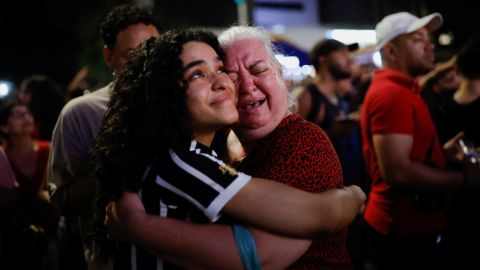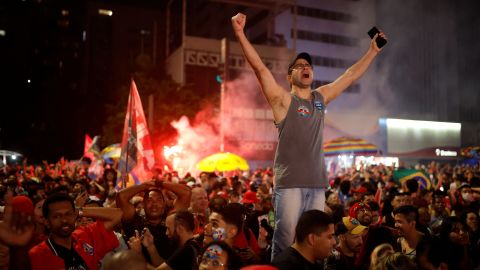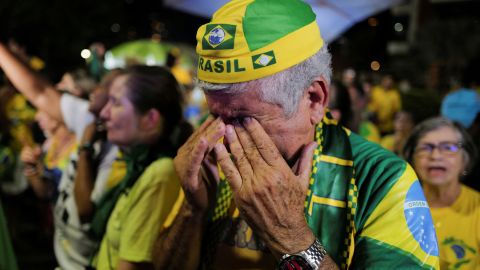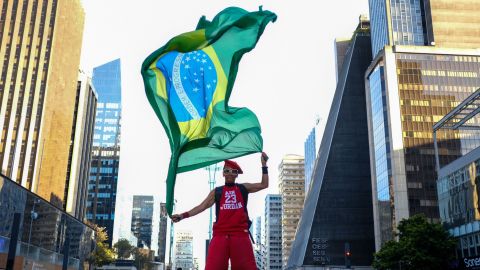CNN
—
Luiz Inácio Lula da Silva is set to become the next president of Brazil, after defeating his rightwing rival, incumbent Jair Bolsonaro, by a razor-thin margin in a fiercely contested run-off election.
The leftist former leader, widely known as “Lula,” received more than 60 million votes, the most in Brazilian history, breaking his own record from 2006.
But despite the huge turnout from his supporters, his victory was by a narrow margin – according to Brazil’s electoral authority, Lula da Silva won 50.90% of the vote and Bolsonaro received 49.10%, denying him a second term.
Lula supporters thronged São Paulo Avenida Paulista on Sunday evening after polls closed. The mood was celebratory even before the results were called, with people setting off flares when he was declared winner by the country’s election authority.
Many had tears in their eyes, telling CNN that they were hopeful for the country, which has been struggling with high inflation, limited growth and rising poverty.

But others on Avenida Paulista expressed fears. Lula da Silva’s razor thin margin has raised concerns that Bolsonaro will not accept defeat, having repeatedly claimed that Brazil’s electronic ballot system is susceptible to fraud. The entirely unfounded allegation has drawn comparisons to the false election claims of former US President Donald Trump.
Hours after the results were announced, Bolsonaro had yet to concede defeat or make any public statement. Meanwhile, videos on social media showed his supporters had blocked highways in two states to protest against Lula da Silva’s victory.
“We will only leave once the army takes over the country,” one unidentified Bolsonaro supporter said in a video taken in the southern state of Santa Catarina.
Speaking to supporters on Sunday evening, Lula da Silva thanked all Brazilians. “The people who voted for me, the people who voted for the opponent, who went to the polls, who consented to fulfill their civilizing commitment of citizenship, I want to congratulate you,” he said, reported CNN Brasil.

“And, above all, I want to congratulate the people who voted for me because I consider myself a citizen who had a process of resurrection in Brazilian politics because they tried to bury me alive and I’m here,” he added.
Lula da Silva and Bolsonaro had previously gone head to head in a first round of voting on October 2, but neither gained more than half of the votes, forcing Sunday’s runoff vote, which became a referendum on two starkly different visions for Brazil.
The election came amid a tense and polarized political climate in Brazil.

Both candidates had used this election to attack one another at every turn, and rising anger has overshadowed the polls and clashes among their supporters left many voters feeling fearful of what is to come. Voters in Sao Paulo told CNN that they were keen to end this election season as soon as possible so the country can move on.
While there were no reports of political violence on Sunday, Lula da Silva allies accused the police of blocking buses and cars carrying Lula voters from getting to voting sites. However, the Superior Electoral Court (TSE), which runs Brazil’s elections, said no one had been prevented from voting and declined to extend voting hours, Reuters reports. The Federal Highway Police said they had complied with court orders, it added.

Lula da Silva was president for two terms, from 2003 to 2006 and 2007 to 2011, where he led the country through a commodities boom that helped fund huge social welfare programs and lifted millions out of poverty.
He left office with a 90% approval rating – a record tarnished however by Brazil’s largest corruption probe, dubbed “Operation Car Wash,” which led to charges against hundreds of high-ranking politicians and businesspeople across Latin America. He was convicted for corruption and money laundering in 2017, but a court threw out his conviction in March 2021, clearing the way for his political rebound.
Bolsonaro ran for his first term as president in 2018 with the conservative Liberal Party, campaigning as a political outsider and anti-corruption candidate, and gaining the moniker “Trump of the Tropics.” A divisive figure, Bolsonaro has become known for his bombastic statements and conservative agenda, which is supported by important evangelical leaders in the country.
During his reelection bid, Bolsonaro appealed to supporters’ moral values and sense of national unity, and branded his left-wing adversary as “the communist threat.” His campaign, which adopted the slogan “God, Nation, Family, and Liberty,” promised an intensified version of his first term: tax cuts, policies that would support the agricultural industry, reduction of environmental rules, and a continuation of his Auxilio Brasil welfare payments to the poorest.
But poverty has grown during his presidency, and his popularity levels took a hit over his handling of the pandemic, which he dismissed as the “little flu,” before the virus killed more than 680,000 people in the country.
Environmentalists also warned that the future of the rainforest could be at stake in this election, as Bolsonaro’s government had become known for its support of ruthless exploitation of land in the Amazon, leading to record deforestation figures.
World leaders congratulated Lula da Silva on his victory.
United States President Joe Biden called the election “free, fair, and credible,” saying he looked “forward to working together to continue the cooperation between our two countries in the months and years ahead.”
Regional leaders described his win as a “time of hope.”
“Your victory opens a new time for the history of Latin America. A time of hope and future that begins today. Here you have a partner to work with and dream big about the good life of our peoples,” President of Argentina Alberto Fernández said on Twitter.
French President Emmanuel Macron described it as “a new chapter in the history of Brazil. Together, we will join forces to face the many common challenges and renew the bond of friendship between our two countries.”
More than 156 million people were eligible to vote in this year’s election. The candidates themselves voted early on Sunday, with Lula voting at a public school in the São Paulo metro Area and Bolsonaro casting his ballot in Rio de Janeiro early on Sunday morning.

Do you mind if I quote a couple of your articles as long asI provide credit and sources back to your website?My blog site is in the very same niche as yours and my users would certainly benefit from some of the information you present here.Please let me know if this okay with you. Thanks!
Hi Contact us for follow link or guest post at attkley@gmail.com. please note it will be paid service. happy blogging